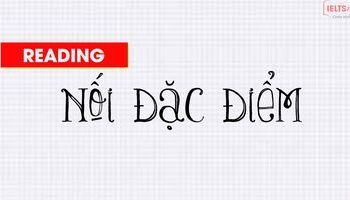Gifts, Giving gifts - Quà tặng là chủ đề thông dụng thường gặp trong IELTS Speaking part 1. Các bạn sẽ quen thuộc với câu hỏi về quà tặng phổ biến, bạn có nhận được quà hay từng tặng quà, một món quà bạn tặng cho một người bạn....Hãy cùng tham khảo bài học này với cô để luyện thêm nhé.
Speaking part 1 sample answer
Giving gifts
- When do people give gifts or presents in your country?
- Do you ever take a gift when you visit someone in their home? [Why/Why not?]
- When did you last receive a gift? [What was it?]
- Do you enjoy looking for gifts for people? [Why/Why not?]

GỢI Ý CHỮA ĐỀ
Câu hỏi 1: When do people give gifts or presents in your country?
Ở đất nước bạn, vào dịp nào mọi người sẽ tặng quà cho nhau?
♦ Câu trả lời mẫu 1: When it comes to some special festivals and special occasions, people usually give gifts, such as birthdays, weddings, Christmas, Valentine's Day, Mother's Day and Father's Day.
♦ Câu trả lời mẫu 2: In our country, there are many occasions to give gifts. We usually send gifts to each as a kind of sincere blessing. And there are some conventional rules for giving gifts. For example, you shouldn't give a clock to somebody, because "sending a clock" has the same pronunciation as "the end of life" in Chinese.
♦ Câu trả lời mẫu 3: Well, Chinese people send gifts on many festivals and occasions: house warming, graduation days, wedding anniversaries. In particular, most gifts are exchanged during the Spring Festival, which is a traditional festival celebrating the Chinese lunar new year.
Từ vựng nổi bật
- sincere blessing (n) lời chúc chân thành
- conventional rules (n) tục lệ
- house warming (n) tân gia
- wedding anniversary (n) đám cưới
Câu hỏi 2: Do you ever take a gift when you visit someone in their home? [Why/Why not?]
Khi đi sang thăm nhà ai đó, bạn có từng mang theo quà tặng không? [Tại sao]
Đối với câu hỏi này, câu trả lời nên là Yes. Sau khi đưa ra câu trả lời Yes, đưa ra các loại quà tặng bạn có thể mang tặng, chỉ cần một hoặc hai ví dụ. Nhưng sau đó đưa lý do giải thích để mở rộng câu trả lời. Có thể đưa ra ví dụ về dịp nào nên tặng quà nào, đối tượng nào.
♦ Câu trả lời mẫu 1: Well, I guess it will be more thoughtful to do so. Most people see it's a kind act if you bring a small gift when visiting someone. It shows that you appreciate being there. Just like an old saying goes "Courtesy demands reciprocity”, which signifies bringing gifts to each other is a good way to sustain the friendship.
♦ Câu trả lời mẫu 2: Definitely! However, it also depends on to whom I send the gifts during visiting. If it is for the elderly people, some healthcare products and multifunctional massagers would be suitable choices. If it is for the young people, they fancy those hi-tech products like iPad, PSP or some latest chic things. Actually, it's the thought that counts.
♦ Câu trả lời mẫu 3: I prefer to send gifts when visiting someone's home. If I have an invitation to a house warming party, I will bring something that can be used to decorate their new home. If I am invited for dinner, I will bring a basket of fruit or home-made food there to show my care and love.
Từ vựng nổi bật
- act (n) hành động
- appreciate (v) trân trọng
- saying (n) câu nói
- courtesy demands reciprocity cử chỉ lịch sự nên có đi có lại
- healthare product (n) sản phẩm chăm sóc sức khỏe
- fancy (v) thích
- chic (adj) thanh lịch, hợp thời trang
- home-made food (n) đồ ăn tự làm
Câu hỏi 3: When did you last receive a gift? [What was it?]
Lần cuối bạn nhận quà là khi nào? [Đó là món quà gì]
Khi gặp câu hỏi này, thí sinh thường trả lời rất đơn giản và ngắn gọn. Câu trả lời có thể đi theo hướng cái gì (what), khi nào (when), tại sao họ lại tặng quà đó (why).
♦ Câu trả lời mẫu 1: The last gift that I received was a bottle of perfume on my birthday party. Because my boyfriend knows that I am a big fan of it. So far, I have a huge collection of perfumes and hope that they will increase in value some day.
♦ Câu trả lời mẫu 2: The last gift I received on my birthday is the best one I have ever received. it was a handmade birthday card given by my confidante. It was a huge card with pictures of us together and beautiful graphic patterns that she drew. It didn't cost much but I love it because she really put her heart into it when making a memorable gift for my birthday.
♦ Câu trả lời mẫu 3: Speaking of last gift, it is a letter I got from my parents in my first year of university. Considering that I suffered a lot from severe homesickness, they said lots of words to comfort me. It gave a feeling that my parents were with me, giving me the courage and care I needed badly. This gift is of special sentimental value to me.
Từ vựng nổi bật
- perfume (n) nước hoa
- a big fan of người hâm mộ lớn của
- confidante (n) bạn gái tâm tình
- put her heart into đặt tâm huyết vào việc gì
- homesickness (n) nhớ nhà
- sentimental (adj) thuộc về tình cảm
Câu hỏi 4: Do you enjoy looking for gifts for people? [Why/Why not?]
Bạn có thích việc lựa chọn quà cho người khác không? [Tại sao?]
Với các câu hỏi tương tự như vậy, thí sinh có thể đưa ra quan điểm của họ từ nhiều góc độ. Đồng thời, nếu thí sính có thể đan xen một cách thích hợp về câu chuyện đi chọn quà của bản thân để tăng sự sống động và chân thực cho câu trả lời.
♦ Câu trả lời mẫu 1: I guess not. It is a waste of time making efforts get the perfect gift. What's more, if the recipient is already wealthy, it will be more difficult to pick up the right present Still, I have little time to consider what they prefer.I am sort of tight-fisted when it refers to the payment.
♦ Câu trả lời mẫu 2: Absolutely, I am really into picking up different gifts for people, my family and closed friends in particular. There is a saying that "It's better to give than to receive."
♦ Câu trả lời mẫu 3: Speaking of looking for gifts for people, it is a good thing. In my view, how much the gift is worth is not important. It is more important that what the sentimental value it has because the sentimental value is something that can't be measured in terms of money.
Từ vựng nổi bật
- recipient (n) người nhận
- pick up (v) chọn lựa
- tight-fisted (adj) chặt chẽ trong chi tiêu

Một số câu trả lời khác
What kind of gifts are popular in your country?
It much depends on the receiver. I would divide the subjects into age groups. For the children who are below 12 years old, toys and study stationary would be the best since their main focus is their lesson at school. Raising the age a bit to those teenagers from 18 and below, who, from what I see, now pay more attention to their outlook, should be given some kind of accessories or clothes suitable for them. if they are 20 to lower than 30, it will need some consideration of what suits them, but I would say anything is possible, people just need to focus on the meaning of the presents. And the most sensitive one is the mature ones, who are older than 30 since the giver needs to show respect for the gifts, so not only does it need deliberation but also the value of the presents should be high.
Do you like to give expensive gifts?
As I have mentioned. I will be willing to do it if the receiver is much older than me because devotion and admiration should lie in the present. For example, on my grandfather's birthday, I bought him an expensive pair of suede loafers, as he loves wearing formal suits going out, also it would be awkward if I had given him only a cake since he could not bear sweets.
How often do you buy gifts for other people?
Not much to be honest, I only buy gifts for other ones when it is their special day. Or it must be someone who is truly close to me. Other than that, I don't find any reason to do so.
Have you ever received a gift which you didn’t like?
Unfortunately, I did, but it was when I was 7 or 8 years old, I asked my dad for a remote toy car, but he refused it and gave me a new ballpoint pen instead. It was such a disappointing moment, but later on, I realized it was an ink point and the pen was quite expensive. I think my dad sincerely bought a pen with the wish for me to study properly.
The examiner asks the candidate about him/herself, his/her home, work or studies and other familiar topics.
Trên đây là bài học liên quan chủ đề Gifts, các bạn cùng tham khảo và thử áp dụng cho bài thi của mình nhé.
Còn thêm chủ đề hay nữa, bạn học thêm nha:





